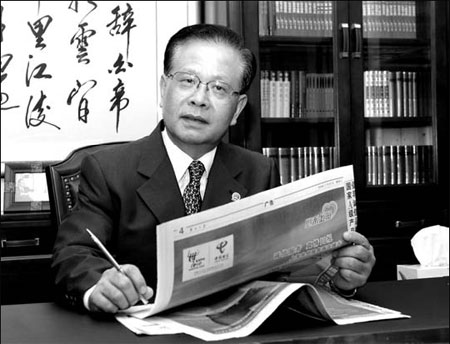 |
|
Gong Xueping, honorable president of the Shanghai Institute of Visual Arts, commits himself to the cause of education in a mission to cultivating more talents in the arts. |
Even as many for-profit college presidents are caught in the everyday struggle for survival, some have been making great strides toward becoming world-class educational institutes.
Gong Xueping, 67, was once the director of the Standing Committee of the Shanghai Municipal People's Congress. The former political heavyweight in Shanghai traded the brilliant evening of his well-spent life to commit himself to the cause of education as honorable president of the Shanghai Institute of Visual Arts (SIVA), the city's only comprehensive private arts college, established in 2005.
"Shanghai has long been a center of arts and culture. But it did not have a specific institute for higher leaning in the arts," says Gong.
He also noticed that students with much potential in the arts received scant attention in higher education.
"We want to cultivate more talents in the arts, especially versatile talents with knowledge of both the arts and business."
SIVA's Songjiang campus looks more like a manor than a regular university. At its northeast corner stands the world-class Practice and Training Management Center, with more than 20 specialized studios equipped with the most advanced facilities.
"It is a fulfillment of every art student's dream," says Gong concerning about the best facilities of the institute. "Our emphasis is on practical subjects that can be accommodated into busy schedules. A conducive and supportive environment is needed to nurture talent in the arts," he says.
SIVA currently has 3,000 students who engage in a variety of fields such as digital media, package design, glassware design, and cultural relics' restoration. The curriculum is designed to impart a global perspective as well as prepare students for a competitive society.
Gong has introduced many far-reaching innovations. One is to reduce the fulltime faculty to 30 percent. In traditional universities, academics are required to devote as much time as possible to research. In SIVA, they are simply employees because of its particular emphasis on practical education.
Gong says this gives students more time to work with their hands. "A successful private school has to walk the tightrope, balancing academics with business," he says. "A large number of full-time faculty means huge tuition costs and a heavier burden on students that's what we don't want to see."
But SIVA has had to face the same problems that other private colleges across the country face.
"Inevitably, students, especially their parents, first came here with distrust," Gong says. "Many students hesitate to go to private universities as they are usually crowded, noisy and lack regulation, but the most crucial problem is with the quality of education."
In 2008, the Ministry of Education granted SIVA equal status in enrollment policy with other public colleges, the only one among the country's 320 private universities to be allowed this.
(China Daily September 17, 2009)